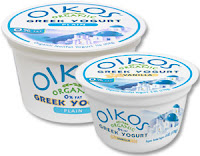 With all the hype around its digestive health benefits, low sugar and high protein content (not to mention its indulgent thick texture), Greek yogurt became a major health food player in 2011. Sales went through the roof - with the top 10 brands raking in over $1.9 billion for the year. Yoplait joined the part, too, but its version is dubious at best - made with "milk protein concentrate" and additives like gelatin instead of 100% strained yogurt like those made by Chobani, Fage and Oikos. While plain, low-fat Greek yogurt is a nutritional powerhouse, some of the flavored options pack more sugar per ounce than soda (about 39 grams per 12-ounce can) and ice cream (about 24 grams for 4 ounces). The worse offenders:
With all the hype around its digestive health benefits, low sugar and high protein content (not to mention its indulgent thick texture), Greek yogurt became a major health food player in 2011. Sales went through the roof - with the top 10 brands raking in over $1.9 billion for the year. Yoplait joined the part, too, but its version is dubious at best - made with "milk protein concentrate" and additives like gelatin instead of 100% strained yogurt like those made by Chobani, Fage and Oikos. While plain, low-fat Greek yogurt is a nutritional powerhouse, some of the flavored options pack more sugar per ounce than soda (about 39 grams per 12-ounce can) and ice cream (about 24 grams for 4 ounces). The worse offenders: - Fage Total 2% with Honey: 29 grams
- Cabot 2% Strawberry: 24 grams
- Dannon 0% Honey & Chobani Blueberry Nonfat: 20 grams, each
 Following McDonald's Commitments to Offer Improved Nutrition Choices initiative announced in July, the company launched a new Happy Meal menu in September. The kids' meal now touts a smaller serving of french fries (reduced from 2.4 ounces to a 1.1 ounce, 100 calorie pack), a 1.2 ounce helping of apple slices (and no longer comes with caramel dipping sauce) and fat-free chocolate or 1% white milk instead of soda. But the price is same even if diners request more fries or soda.
Following McDonald's Commitments to Offer Improved Nutrition Choices initiative announced in July, the company launched a new Happy Meal menu in September. The kids' meal now touts a smaller serving of french fries (reduced from 2.4 ounces to a 1.1 ounce, 100 calorie pack), a 1.2 ounce helping of apple slices (and no longer comes with caramel dipping sauce) and fat-free chocolate or 1% white milk instead of soda. But the price is same even if diners request more fries or soda. Yes, it's a step in the right direction. But a measly half serving of fruit and sugary chocolate milk can't save a meal based on a fatty hamburger, cheeseburger or Chicken McNuggers, plus fried potatoes.
6. Gluten-Free Foods
 The latest villain in the diet world, gluten - a protein compound found in wheat and related grains, including barley and rye - has been blamed for things like headaches and weight gain. In 2011, gluten-free labels popped up on everything from coffee (which is naturally gluten-free) to snack foods (General Mills now offers more than 300 gluten-free products). Sales reached $1.2 billion last year, more than double that of 5 years ago.
The latest villain in the diet world, gluten - a protein compound found in wheat and related grains, including barley and rye - has been blamed for things like headaches and weight gain. In 2011, gluten-free labels popped up on everything from coffee (which is naturally gluten-free) to snack foods (General Mills now offers more than 300 gluten-free products). Sales reached $1.2 billion last year, more than double that of 5 years ago.Sure, skipping the giant bowl of pasta, garlic bread and croissants in favor of meat, fresh produce and dairy can do a body good. But "processed foods specially formulated to be gluten-free are often higher in calories and sugar, and lower in fiber and B vitamins than their gluten-containing counterparts - and they're twice as expensive," says Davis. While these items are great for people diagnosed with celiac disease (which affects less than 1% of the population) or gluten intolerance - "they offer zero health benefits to the vast majority of us," he says

No comments:
Post a Comment